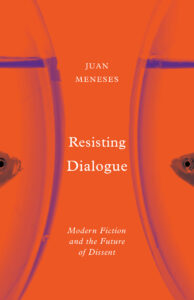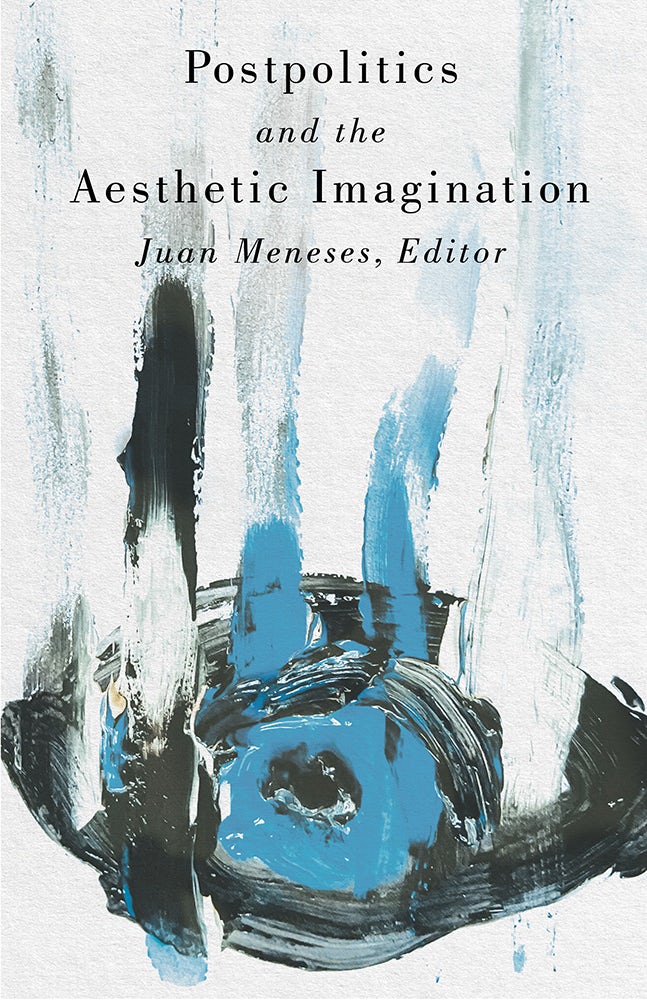Juan Meneses is a scholar and teacher of World and Anglophone literature (of both the 20th and the 21st centuries), theory, and visual studies, and an occasional translator.
His research and teaching work is concerned with a variety of interrelated topics, from transnationalism to the global, and from postcolonialism to the Global South.
He is the author of Resisting Dialogue: Modern Fiction and the Future of Dissent (University of Minnesota Press, 2019) and editor of Post-Politics and the Aesthetic imagination (University of Minnesota Press, 2025), and has published or forthcoming articles and book chapters on a variety of issues (see below).
Books
- Juan Meneses, Resisting Dialogue: Modern Fiction and the Future of Dissent. University of Minnesota Press, 2019.

Resisting Dialogue: Modern Fiction and the Future of Dissent reassesses our assumptions about dialogue and, in so doing, about what a healthy society should look like.
The book argues that, far from an unalloyed good, dialogue often serves as a subtle tool that perpetuates the issues it is intended to address. With an investigation at its center of “illusory dialogue” (a particular dialogic encounter designed to secure consensus), the book offers a series of close readings of novels from the English-speaking world written in the past hundred years to show ways of restoring the potential of dialogue.
Engaging with the three main literary periods of the last century (modernism, postmodernism, and contemporary literature), the book offers analyses of E. M. Forster’s A Passage to India and Jean Rhys’s Voyage in the Dark; Graham Swift’s Waterland, Ian McEwan’s The Child in Time, and Jeanette Winterson’s The Passion; and Mohsin Hamid’s The Reluctant Fundamentalist, Indra Sinha’s Animal’s People, and Helon Habila’s Oil on Water.
_____ Reviewed in MFS Modern Fiction Studies; American Literary History; London School of Economics Review of Books; The Year’s Work in English Studies; CompLit. Journal of European Literature, Arts and Society; and Law, Culture and the Humanities.
- Juan Meneses (ed.), Postpolitics and the Aesthetic Imagination. University of Minnesota Press, 2025.
Gathering together writings from an array of scholars, editor Juan Meneses asks: can an aesthetic theory of postpolitics help us understand and counteract the most insidious processes of depoliticization? The contributors to this volume explore how the aesthetic imagination can play a crucial role in reenvisioning key elements such as agency,
rights, and responsibility with a survey of various artistic mediums—film, dance, music, literature, and digital media.
Postpolitics and the Aesthetic Imagination argues for a conscious deployment of aesthetics to resist political anesthesia and promote a more just society, underscoring the role of the imagination in political engagement and change.
Selected Articles and Book Chapters
- Juan Meneses, “Postmortem Comparatism.” Eds. Waïl Hassan and Shu-mei Shih, Worlds of Comparative Literature: The ACLA State of the Discipline Report State of the Discipline Report (London: Blomsbury, forthcoming 2026).
- Juan Meneses, “The Failure of Climate Dialogue: Why Global South Voices Must Be Climate Talk Leaders,” Public Humanities (2025): 1–7.
- Juan Meneses, “Introduction: Sensing the Postpolitical.” Ed. Juan Meneses, Postpolitics and the Aesthetic Imagination (Minneapolis: University of Minnesota Press, 2025): 1–24.
- Juan Meneses, “A Haunted Present: Postpolitics, Nuclear Waste, and the Colonization of the Future.” Ed. Juan Meneses, Postpolitics and the Aesthetic Imagination (Minneapolis: University of Minnesota Press, 2025): 195–218.
- Juan Meneses, “From the South Out: Neoliberalism, Horizontality, and the Post-Global Subject in Mohsin Hamid’s How to Get Filthy Rich in Rising Asia,” in Alfred J. López and Ricardo Quintana-Vallejo (eds.), The Routledge Companion to Literature and the Global South (New York: Routledge, 2023): 31–41.
- Juan Meneses, “The Visuality of Environmental Disasters.” Ed. Cajetan Iheka, Teaching Postcolonial Environmental Literature and Media (New York: Modern Language Association of America, 2022): 263–272.
- Juan Meneses, “Queering the Nation: Hegemonic Masculinity, Negative Sovereignty, and the Great War in Sebastian Barry’s A Long Long Way,” European Review 29.3 (2021): 354–369.
- Juan Meneses, “Toward an Environmental Theory of Afropolitan Literature.” Ed. James Hodapp, Afropolitan Literature as World Literature (London: Bloomsbury, 2020): 85–102.
- Juan Meneses, “Historical Restoration, Narrative Agency, and Silence in Graham Swift’s Waterland,” Journal of Modern Literature 40.3 (2017): 135–152.
- Juan Meneses, “‘Like in the Gringo Movies’: Translatorese and the Global in Roberto Bolaño’s 2666.” Ed Russell Cobb, The Paradox of Authenticity in a Globalized World (New York: Palgrave MacMillan, 2014): 175–185.
- Juan Meneses, “Reconsidering International Comics: Foreignness, Locality, and the Third Space,” Journal of Graphic Novels and Comics 5.1 (2014): 58–69.
- Juan Meneses, “The Bliss of an Eternal Deferral: The Temporality of Cinema in Liz Hughes’ Cat’s Cradle,” Short Film Studies 3.2 (2013): 139–143.
- Juan Meneses, Review of Jessica Berman’s Modernist Commitments. Ethics, Politics and Transnationalism, Modern Fiction Studies 59.1 (2013): 211–213.
- Juan Meneses, “A Bakhtinian Approach to Two Historical Graphic Novels: The Individual in Art Spiegelman’s Maus and Chester Brown’s Louis Riel,” International Journal of Comic Art 10.2 (2008): 598–607.
Selected Conference Papers
- “Reclaiming ‘Meanwhile’ as Non-Normative Temporal Relationship,” in “Odd Temporalities” (seminar). American Comparative Literature Association. Virtual: May 2025 (seminar co-organizer and presenter).
- “Unself.” Modern Language Association. New Orleans, LA: January 2025 (paper accepted).
- “Postmortem Comparatism.” American Comparative Literature Association. Montreal, Canada: March 2024.
- “Why Speak to Animals? Dialogue, Politics, and the Literary Imagination,” Sheffield Animal Studies Research Centre. Sheffield University, UK: October 2023.
- “Chronicle of a Death Foretold: Postcoloniality and the End of Politics.” American Comparative Literature Association. Chicago, IL: March 2023.
- “Eroded Citizenship: The Figure of the Denizen in J. M. Coetzee’s Life & Times of Michael K.” Modern Language Association. San Francisco, CA: January 2023.
- “Insolent Animals: Decentering Homo Politicus for a Planetary Politics.” American Comparative Literature Association. Virtual: June 2022.
- “Is the Post- in Post-Apocalyptic the Post- in Post-Political?” Modern Language Association. Washington, DC: January 2022.
- “Sensing the Post-Political,” in “Post-Politics and the Aesthetic Imagination” (seminar), American Comparative Literature Conference. April 2021 (seminar organizer and presenter).
- “Eco-Nationalism, Inhabitancy, and the Politics of Denizenship in Yoko Tawada and Barbara Kingsolver,” Modern Language Association. January 2021.
- “Literature and Post-Political Theory,” panel organizer and chair. Modern Language Association. Seattle, WA: January 2020.
- “Post-Humanism, Animality, and Dialogue in the Anthropocene.” Modern Language Association. Seattle, WA: January 2020.
- “Post-Politics and the Valences of Literary Critique.” American Comparative Literature Association. Los Angeles, CA: March 2018.
- “Shedding Light: Environmental Destruction and the Politics of Visibility.” Association for the Study of Literature and the Environment. Detroit, MI: June 2017.
- “Postcolonial Misrecognition in Jean Rhys’s Voyage in the Dark.” Modern Language Association. Philadelphia, PA: January 2017.
- “Counterstories: Visual Spectacle and the Global Novel.” American Comparative Literature Association. Cambridge, MA: March 2016.
- “Domination Through Dialogue: Plurality, Tolerance, and Understanding as Instruments of Political Dispossession.” Modern Language Association. Austin, TX: January 2016.
- “Reading Images, Seeing Words.” Association for the Study of Literature and the Environment. Moscow, ID: June 2015.
- “The Modernist Character as Postcolonial Model.” Modernist Studies Association. Pittsburgh, PA: November 2014.
- “‘Because Our Fathers Lied’: National Allegiance and the Great War in Sebastian Barry’s A Long Long Way.” Modern Language Association. Chicago, IL: January 2014.
- “Renting as Transnational Poetics in Roman Polanski’s The Tenant.” Film and History. Madison, WI: November 2013.
- “Land Matters: Dissent and Political Agency in South African Fiction.” Association for the Study of Literature and the Environment. Panel chair and presenter. Lawrence, KS: June 2013.
- “‘Like in the Gringo Movies’: Parodic Translation in Roberto Bolaño’s 2666.” American Comparative Literature Association. Providence, RI: April 2012.
- “Representation/Re-presentation: When Historicizing is the Problem.” Midwest Conference on British Studies. Terre Haute, IN: November 2011.
- “Le Courrier International: International Newspaper Comics Language and the Image-Text Third Space.” Graphic Engagement: The Politics of Comics and Animation. West Lafayette, IN: September, 2010.
Selected Honors and Awards
- Reassignment of Duties, UNCC, Fall 2025
- National Humanities Center, Research Residency, 2022
- Faculty Research Grant, UNCC, 2021
- Chancellor’s Challenge Fund, UNCC, Spring 2021
- CLAS Junior Faculty Development Award, UNCC, Fall 2017
- Faculty Research Grant, UNCC, 2015
- Robert Liddell Lowe Fellowship for Best Dissertation on 19th- or 20th-Century British Literature, Purdue University, 2012–2013
- Quintilian Award for Outstanding Continuing Development, Purdue University, 2012
- Quintilian Award for Excellence as Instructor, Purdue University, 2011
- College of Liberal Arts Dean’s Instructional Excellence Award, Purdue University, 2010
- LaCaixa Excellence Fellowship for Graduate Studies in the USA, 2008–2010
Research Interests
- World and global literatures
- 20th– and 21st-century Anglophone and postcolonial literature
- Theory
- Visual studies
- Global studies
- Translation
- Ecocriticism
Courses Taught
- ENGL 6687 Seminar in Global Literature: Contemporary Global Fiction (Graduate)
- ENGL 6890 Global Crisis in Post-World War II Fiction (Graduate)
- ENGL 6890 Contemporary Caribbean Literature (Graduate)
- ENGL 6101 Introduction to English Studies (Graduate)
- ENGL 6072 Contemporary Literature and the Environment: Fictions of the Anthropocene (Graduate)
- ENGL 4852 Orhan Pamuk and the World Novel (Honors)
- ENGL 4752 Specters of Violence in Modern and Contemporary Latin American Literature (Honors)
- ENGL 4072/5072 Postcolonial Literature (Graduate/Undergraduate)
- ENGL 4750/5072 Migrants, Travelers, and Exiles in Literature and Film (Graduate/Honors)
- ENGL 4112 Modern World Literature: Global Issues (Undergraduate)
- ENGL 4112 Modern World Literature: 1664 to the Present (Undergraduate)
- ENGL 4050/5050 Issues in Global Cinema (Graduate/Undergraduate)
- ENGL 3217 Modern British Literature (Undergraduate)
- ENGL 3050 Contemporary British Fiction (Undergraduate)
- ENGL 3050 Graphic Novels and Animation Around the World (Undergraduate)
- ENGL 3100 Approaches to Literature (Undergraduate)
Education
- Ph.D., English, Purdue University
- M.A. English Literature, Universitat Autònoma de Barcelona
- B.A., English Studies, Universitat Autònoma de Barcelona
- B.A., Translation and Interpreting, Universitat Autònoma de Barcelona
Professional Appointments
- Associate Professor, Department of English, UNC Charlotte
- Coordinator, Comparative Literary and Cultural Studies Minor, UNC Charlotte
- Assistant Director, English Honors (2022–2025)
- Affiliate Faculty, Latin American Studies, UNC Charlotte
- Editor, H-Empire (2014–2021)
